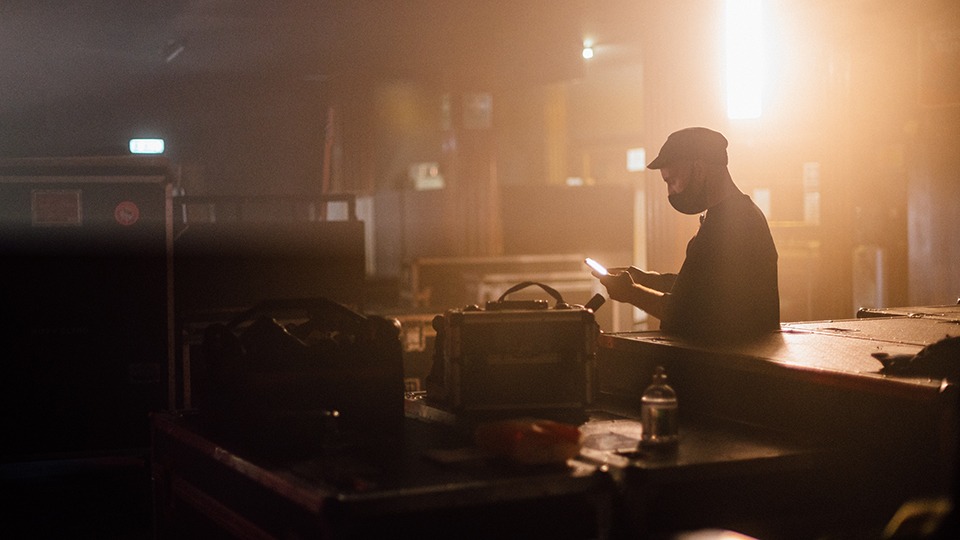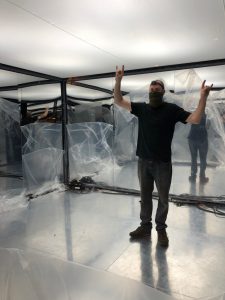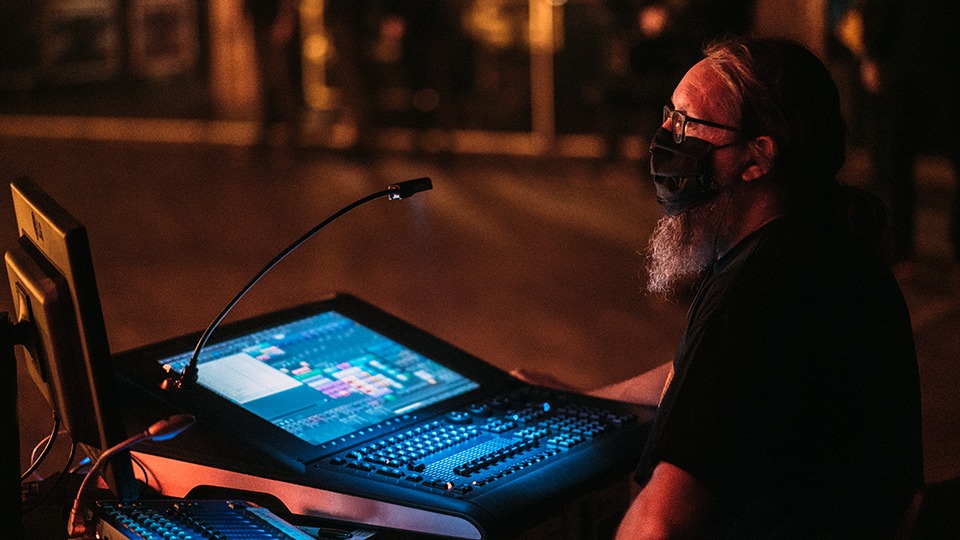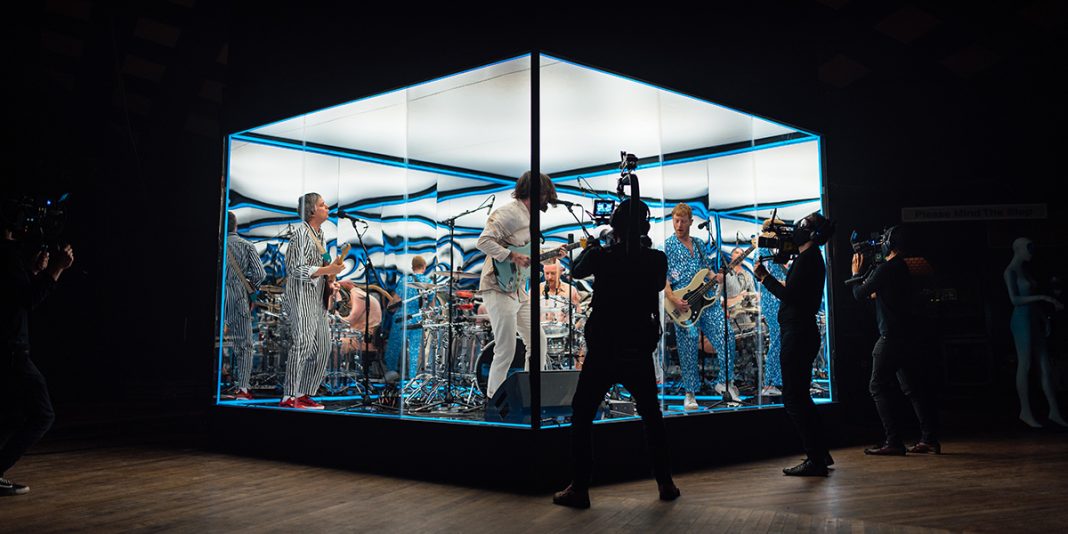To mark the release of their eighth studio album, A Celebration Of Endings, Biffy Clyro performed a one-off, live show at The Barrowland Ballroom Glasgow on 15 August. The livestreamed performance saw the band play their new album in full for the first time across a range of spaces in the empty Glaswegian venue – creating a bespoke experience for live music fans in lockdown while simultaneously providing much-needed work for production crew at the height of UK’s festival-less summer.
Biffy Clyro were on the verge of beginning a 24-month album cycle when the lockdown of live events came into force. “We had an inkling for a month prior to the announcement, that things were going to slow down or stop, so we began to cautiously slow down on purchasing equipment and holding off confirming flights and hotels for the year ahead to protect ourselves,” commented Tour and Project Manager, Neil Anderson, who has been on the road with Biffy Clyro since 2001.
Following the release of the album, the Scottish band were set to embark on a busy calendar of promo, live shows and music festivals, including visits Stateside – one of the first ventures that the team put the brakes on as the COVID-19 pandemic developed. “The cancellation of BBC Radio 1’s Big Weekend and Glastonbury sounded a death knell for our summer of festivals.”
While he was well into the advancing process for summer, Anderson was able to release the various holds the band had on travel, accommodation, production and logistics. “I did so with a heavy heart in the latter two areas, knowing that our long-time suppliers would be suffering adversely through it all,” the PM reported. “In the case of one of our main suppliers, I believe over the span of a week, they lost 90% of their bookings for the entire year. Thankfully, we’ve been able to develop some other Biffy-related projects in that time, and I’ve been able to spend time working from home on those, which has kept me grateful and just busy enough to not be climbing the walls.”
The Barrowland livestream arose from the band’s desire to do something with their newfound wealth of time in lockdown, and frontman, Simon Neil’s vision for the show. “Right from the first conversation, his idea was crystallised, and the ambition in the early stages through to the delivery of the show, was off the scale,” the TM said. “It quickly became apparent that to put it together would be a huge team effort, such were the many moving parts of the production.”

Anderson called upon the expertise of film company, Forest of Black; Scott Munro of SM Lighting, Neg Earth’s Sam Ridgway and Rigtek at Barrowland for lighting and rigging proficiencies. Trucking was handled by Natasha Highcroft at TransAm Trucking, Scotia Events supported staging and local crew, while Rock Steady oversaw venue and artist security, with the catering serve by the Really Delicious team.
Simon Neil’s original concept was to utilise more than one performance space and embrace the possibilities of an audience-less venue, while maintaining the same energy as a “proper” live show. Anderson explained: “The band wanted to really push the envelope and deliver something to their fans well beyond the expectation of what a livestream could be.”
The livestream was split into sections. The first was a brief soundcheck performance of a handful of the band’s older songs. The second was a series of acoustic tracks in the backstage dressing room, utilising Neumann KU-100 binaural microphones to generate an immersive audio experience for viewers with headphones. The third, and main section, was the band’s performance of their new album, A Celebration Of Endings, which was the headline concept of the livestream.
“The most important thing was to highlight the main event, so the earlier performances were presented almost as a precursor to the main show with a countdown clock onscreen, counting down to the beginning of the album performance,” Anderson pointed out.
Creative / Video Director, Oscar Sansom of Forest Of Black conceptualised the presentation of the livestream, grading two earlier sections in monochrome, presenting the main performance in full colour. Art Dept Lead, Alice Walker, DoP, Jamie Quantrill and Production Assistant, Kenneth Campbell joined Sansom and Producer, Sarah Allan in the visual team. “The way the show developed through the 11 tracks of the album enabled us to keep elements of the developing production completely hidden, until their reveals as the show progressed,” Anderson said.
The band began on the stage at the Barrowland before frontman, Simon Neil and pianist, Richard Ingram moved into the centre of the room, flanked by the six musicians from the Cairn String Quartet. From there, the performance areas expanded, revealing a ‘mirrored cube’ located at the back of the room, in which the band performed.

In another corner of the venue, Stage Manager, Richard ‘Churd’ Pratt arranged every possible amp cabinet from the band’s warehouse stock to create a wall of amps to surround the band during the performance. The show finished with every band member in a different area of the venue, including a portion of the song where frontman, Simon Neil left the main room of the venue, travelled down the stairs of the Barrowland and outside of the venue, before returning to the band upstairs to finish the song and set. “That was a wonderful moment,” Anderson remarked.
‘A 52-PAGE RISK ASSESSMENT’
The spread of COVID-19 presented an entirely new challenge without a blueprint during the planning stages. “I began with a blank piece of paper, that became a 52-page risk assessment by the time we were finished. Initially, I approached it by taking our existing risk assessment, and applying it to the legislation, medical and governmental advice as to its mitigation,” Anderson recalled.
The core Biffy band and crew existed in a bubble, throughout the rehearsals and the show itself, as well as in the week prior. While Scotia Events local crew were isolated entirely, the production load-in and build occurred in isolation, prior to the core crew arriving.
“The nature of the Barrowlands dictates a difficult load-in,” Anderson conceded. “We distanced local crew where possible, and had every case sterilised and wiped down upon entry to the venue. We established one-way loading routings within the venue, as well as minimising the instances of multiple-person lifts, using the winch for the bulk of it. It took far longer than it would have done generally, but it was entirely necessary for both the protection of the personnel involved, and for the integrity of the production.”
Excess and plentiful PPE, courtesy of Tiger Supply, was supplied and available throughout the venue, crew temperatures were scanned upon entry, and everyone was asked to fill out and supply health declarations in advance and every morning. “We employed a cleaning crew who remained onsite, constantly cleaning and sterilising every communal and touch-point area of the venue,” Anderson explained. “Individual departments were also issued with cleaning and sterilising materials, and when the band and crew were onsite, they would continue to keep their own areas clean.”
Catering was moved to outside of venue, situated on the street in a film-set catering van, to avoid and minimise any indoor communal areas. “Forest of Black Producer, Beth Allan and I worked closely to keep everything tight, I can’t express how helpful Beth was throughout the entire span of the project, it’s always a huge privilege to work alongside her and Forest of Black,” he said. “We also employed Lee Worrall from DF Concerts in Glasgow to further assist us on the days we were in the venue.”
It was apparent as the project progressed how much of a hurdle COVID-19 mitigation was on proceedings, and above all, the purse strings. “It massively increased the financial burden, as well as adding many further logistical formalities in deploying the production,” Anderson explained. “Even the obvious aspects, such as the enforcement of masks, visors, and in some cases gloves and aprons, became problematic – making the crew members physically uncomfortable as they performed their tasks. It took some getting used to.”
He credited the professionalism of the crew involved in proceedings. “It is to the credit of everyone involved, that everyone took on these restrictions admirably, without complaint or contradiction,” Anderson enthused. “We were incredibly lucky to have had such a diligent and professional group of people involved with this production.”
The band were very clear that they wanted to perform the set start-to-finish, which meant the entire show had to be in place throughout without much option to re-use or re-purpose individual elements of the production, such as lighting, monitoring and backline equipment. “It would have been far simpler from a production and filming point of view to simply film every song a few times, then reset to the next song, but this would have completely undermined the band’s intention to perform a proper show,” the TM hypothesised.

Lighting Designer, Richard Larkum specified the equipment for the live shows, working in tandem with RigTek – the in-house rigging firm at Barrowland – to hang four separate rigging areas, situated above the stage. “The ‘mirrored cube’ was probably the most difficult, trying to create it in a way that enabled us to do what was needed technically, in terms of backline and lighting without compromising the clean and minimal aesthetic,” Anderson reflected on the feat of engineering.
Stage Manager, Richard ‘Churd’ Pratt, Monitor Engineer, Dan Speed, and Drum Technician, James Wiffen oversaw five different backline and monitoring setups, with the band moving constantly between these positions. “They didn’t stop moving throughout the entire show. FE Audio in Glasgow were incredibly helpful throughout the process,” Anderson stated. “It was most certainly not a controlled video shoot – it was a live show in a very unique circumstance.”
The only thing missing, Anderson said, was the energy of the crowd. “I can’t express how peculiar it was, doing ‘the walk to stage’ without the audience noise. Especially in that room, the audience at the Barrowland is something quite beyond what we tend to experience anywhere else,” the TM continued. “There’s something about the electricity in that room, especially with Biffy, that just can’t ever be replaced so whilst I think our stream showed that you can still feel the vibe and the intensity from the artist, it was still missing a crucial, and irreplaceable element – the interaction of the band and the audience, and the way that elevates both the performance and the reaction.”
In summary of his newfound livestreaming experience, Anderson commented: “The lockdown has forced us to begin to think about how to communicate and share new music with the world. I know Simon felt compelled to present something for the fans, and the constraint put on him was a huge part in shaping his way of thinking.” However, despite getting as close as possible to portraying an authentic live experience amid a global pandemic, he believed that livestreaming is certainly not a “viable replacement to the unique energy of a show with an audience” when live events can return safely with audiences in tow.
In fact, the response received from viewers of the livestream was “overwhelming”. “It felt like the show gave people the same sort of time-out from reality that a real show would have – the ability to shut off from the outside world for a couple of hours, and to live in the moment. In the context of the pandemic, I think that’s huge, given how it has inflicted such suffering on the world, and how much it has flattened the ability of people to communicate and to be together in a communal moment,” Anderson suggested. “Uniting people in something, even for an hour, seems like a hugely positive achievement.”
The TM explained that the band’s decision to perform the show live allowed the entire process to feel more authentic than a video shoot or studio session. “We’ve done a lot of Zoom-style acoustic performances this year, as well as low-key performance streamed on social media, but this felt like we were preparing for a proper tour,” Anderson summed up. “The number of hours put in by everyone, in the month leading up to it, would be comparable to the sort of advancing for an entire summer of festivals, so it definitely felt different from the other things we’ve done this year.”
The long-standing Biffy Clyro tour personnel comprised Stage Manager, Richard ‘Churd’ Pratt; Lighting Designer, Richard Larkum; Monitor Engineer, Dan Speed; Drum and Logic Technician, James Wiffen; Bass Technician, Rory Sakalas; Guitar Technician, Lee Birchall; Venue Liasion, Lee Worrall; Artist Assistant, Francesca Neil; Audio Producer, Adam Noble; RED TX’s Ollie Nesham and Tim Summerhayes; FE Live’s Ryan McIlravey and three on-site technicians.
Additional support came in the shape of DF Concerts’ Dave McGeachan; Skan PA’s Chris Fitch; Neumann/Sennheiser’s Andy Egerton; Fender’s Neil Whitcher; Ashdown’s Dan Gooday; Marshall’s Joel Manan; London Drum Company’s Simon Jayes and ESP Rentals’ Raymond Wilson. The overall livestream was produced by Driift Live. “Once we were all on the same page about how we’d approach the performance, it felt far closer to a real show than it would have done, had the performance been dictated by production or filming logistics,” Anderson concluded. “I think that, more than anything, it made it feel closer to a proper show than any of us necessarily expected, though it was peculiar not having to do the usual ‘pre-doors-open’ operations.”
This article originally appeared in issue #254 of TPi, which you can read here.
Photos: Kevin J. Thompson & Neil Anderson





